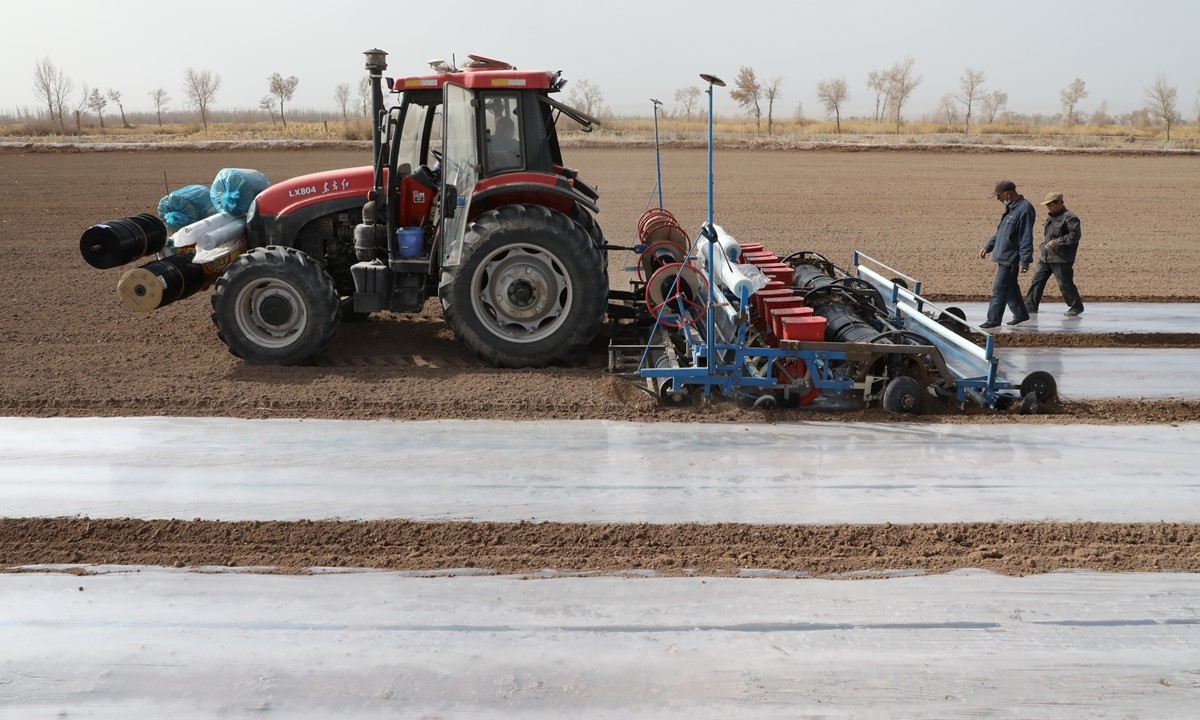China's total arable land amounted to almost 1.28 million sq km (490,000 sq miles) by the end of...
China Pivots to Ensuring Food Security

Amid rising geopolitical uncertainties in the world, the Chinese government has pledged to do all in its capacity to ensure the supplies of food, such as corn and soybeans, and provide sufficient fertilizers so that farmers could expand agricultural output and increase grain storage.
From Xinjiang in China's northwest to Jilin in the northeast, Chinese farmers are going all out during the spring plowing season in response to the government's call to ensure adequate food supplies and stabilize market prices.
In a corn seed field in Manas County in Xinjiang Uygur Autonomous Region, five high-horsepower tractors equipped with China's self-developed BeiDou navigation system are precisely operating according to the pre-set sowing route, significantly enhancing the seeding efficiency for corn.
Driven by calls to facilitate food output, Manas County is turning itself into a base for national hybrid corn seed production, assisted with advanced farming technology.
Meanwhile, as the coronavirus infections have been largely controlled in Jilin Province, a major grain production hub in the country's northeast, spring farming activities are resuming in an orderly manner.
Speaking to the Global Times, Gao Guangyong, a farm owner and farming services provider in Dongfeng County of Jilin, said that they are beefing up farming after the government opened green channels that ensured smooth logistics for agricultural materials. "Now people can travel between cities with special passes issued by the government," Gao said.
China's top economic planner, the National Development and Reform Commission (NDRC), said recently that China's food supply is adequate to meet current market demand while pledging to further strengthen production expansion and stabilize market prices as the country enters the critical moment of the spring plowing season.
While the country is ramping up efforts to ensure food supplies, key agriculture-related products, such as fertilizers, have seen widening gaps between supply and demand due to global uncertainties, which are pushing up market prices. Data shows that China's dependence on foreign potash fertilizers is as high as 50 percent. Exports of the fertilizer from Russia and Belarus account for more than 30 percent of the global trade volume.
Since the start of the conflict between Russia and Ukraine, the sharp surge of energy prices and concerns about supply disruptions have panicked the market, Chinese analysts said.
Facing external uncertainties affecting the supplies and prices of potash fertilizers, the NDRC instructed key potash fertilizer production enterprises to do their utmost to increase production and supply. It also deployed one million tons of national potash fertilizer reserves, while ramping up potash fertilizer imports.
The policy has had a positive impact. Yu Lei, an independent industry analyst, told the Global Times recently that potash fertilizer used to be sold at a maximum price of 5,000 yuan per ton, but it has dropped to 4,500 yuan now, and the supply is relatively sufficient after the release of one million tons of reserves.
Editor’s Take:
It is interesting to witness this dramatic policy shift by the Chinese government. Typically, a huge importer of agricultural and food products, China now appears to be pushing for greater production and food independence and security. Do they see something coming that most nations aren’t aware of or simply getting ahead of the game? The Chinese people are very tenacious and persistent in pursuing goals set by the government and in their own best interest. Perhaps we should be paying closer attention to what this could mean down the road? One thing to keep in mind, however, is the very limited amount of arable land to feed such a large population. That is likely to be the most limiting factor to their ambitious plans!








